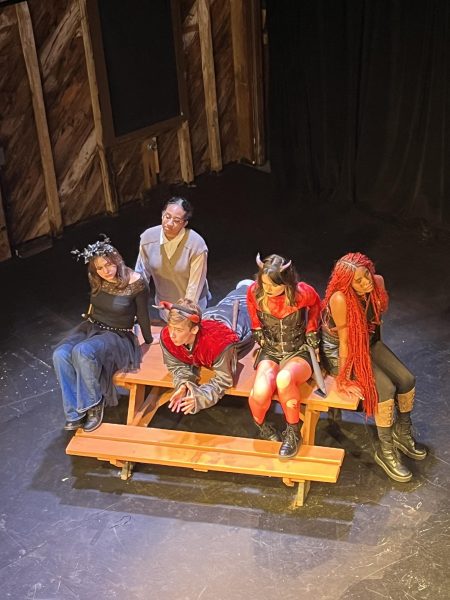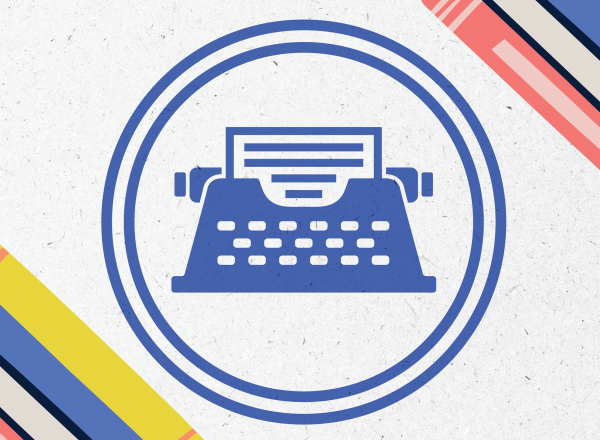Keynote panel highlights Ernest J Gaines’ writing and inspirations
White plays several notes on his clarinet to demonstrate how music inspired Gaines.
On March 15, Roger Williams University’s John Howard Birss Jr. Memorial Program showcased the “Talking About Race Through Storytelling and Music” keynote panel which centered on reflections pertaining to “The Autobiography of Miss Jane Pittman” by Ernest J. Gaines. The panelists included author Danzy Senna, archivist and professor Cheylon Woods and musician Michael White. It was not necessary to read the book prior to the panel, but it certainly helped viewers comprehend the speakers’ reflections in a greater way.
The event started at 7 p.m., kicking the conversation off about Gaines and his sources of inspiration within his writing. The speakers agreed that his biggest source stemmed from his aunt Augusteen. Woods shared that Augusteen raised Gaines and his siblings. What was special about his aunt was that she could not walk and although a reason was not given for this disability, that did not stop her from engaging with her community.
Augusteen acted as a leading force in Gaines’ life as she went about life normally. She cooked, cleaned, tended to the garden and taught Gaines and his siblings how to do the same. The local community went to her for conversations, to share sermons and would bring their children to watch her. She was a presence that commanded the love and respect of those around her because that is what she gave in return. She was a force that reminded Gaines to always remember who came before him and what those individuals had sacrificed.
Following this conversation, Senna was asked why storytelling would be used to talk about race. She started by speaking of her great respect and love for Gaines. Black writers are often expected to be anthropologists or political activists and there is a certain expectation that they are there to teach, go on social media and share what they think. Senna expressed that Gaines’ refusal to do that was what made him a great student and teacher of the human experience.
In comparison, white artists, especially white male artists, are not often asked what the point or position of their work is. Gaines wanted to illustrate that the voices in his work and in his characters were no better or worse than he was or than we all are as humans. He absolutely refused to speak against any of his problematic characters because doing so would splinter people’s opinions; they would no longer focus on his work as a whole.
Every character was worthy of human experiences, flaws, greatness and complexity. For these reasons, he actually rejected the role of storyteller to keep that space and to protect his characters.
White was called next to talk about how music tells a story. This part of the conversation was lengthy and very engaging. He even took out his clarinet to play a few notes in order to emphasize how Gaines became inspired. That was another thing about Gaines; as inspired by Faulkner and Twain as he was, music also heavily influenced him.
White spoke about the different music found in Louisiana and how musicians have a similar role to writers in telling a story, the advantage in instrumental music being that no one knows exactly what you are saying. Gaines himself compared writing to music. Black music influenced him more than Black writers. His biggest influences were blues and jazz and he was interested in the stories, nuances and the variations found in the notes.
Gaines wanted to and did write the story of people’s lives as music did. Woods made the comparison that when you write dialogue, you are listening to the music of dialogue or ‘how people speak,’ and that is what Gaines alluded to when he said he listened to the voices. While discussing his passion for music, the idea was brought to light that anyone could learn to play an instrument. Yet, it is at that moment when you begin to find your voice that you are able to express yourself and learn how to actually make music.
While Gaines was trained and taught how to write in California, he could not write unless he was in Louisiana; he loved and missed the South. Gaines wrote about this region because he wanted to see his reflection and the reflection of his community in literature which he could not find.
Something that all three presenters echoed is that Gaines studied. He studied the form of writing and the mechanics. He practiced and practiced. He would study the history and the characters in order to write an accurate reflection of his community that he deeply loved.
White shared that many of Gaines’ characters remind him of people he actually knows or has met. Woods and White shared the sentiment that due to his characters being well developed, while one might not find themselves forgiving his more problematic characters, they could understand where they are coming from.
These are the concepts that Gaines incorporated into his writing. In his work, sometimes there are more colors or nuances coming out. White continued and said that at times, he felt the ghost notes in his work. Woods added she felt the ghosts as representing the spirits of the people who have gone.
To learn more about Gaines and his work, visit RWU’s digital exhibit of “The Autobiography of Miss Jane Pittman.”





